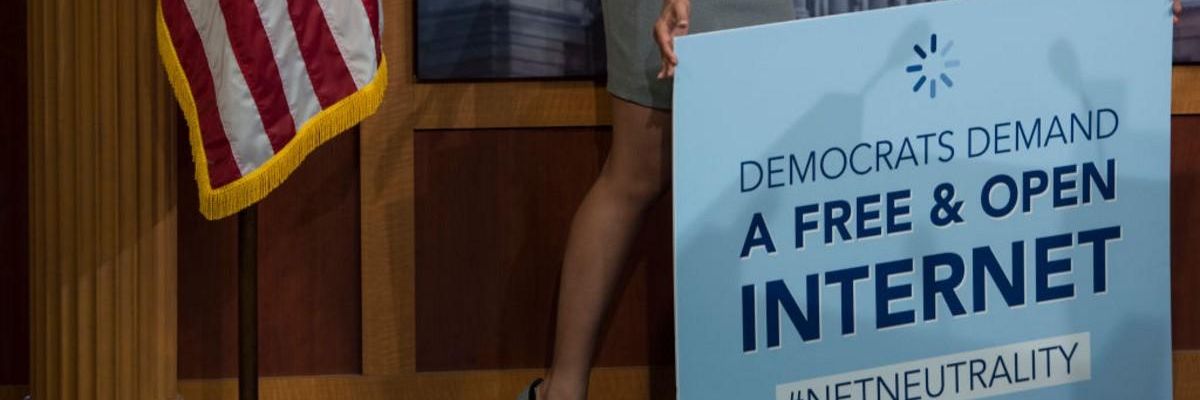For the internet, a lot is riding on the game of chicken Congress is playing around the infrastructure packages. The current legislation includes billions of dollars to fund a more permanent benefit that would make internet bills more affordable for struggling families--a historic step toward bridging the digital divide.
But with negotiations ongoing, it's a good time to remember that Congress isn't the only body in Washington, D.C., with the power to fix our broadband woes.
Net Neutrality is the principle that internet service providers should not be able to block, throttle or otherwise discriminate against the content you access online.
Just a few minutes north of Capitol Hill stands the Federal Communications Commission, the federal agency charged with overseeing our national communications ecosystem and ensuring that all people have universal access to critical communications tools, including internet service.
And right now, we need that oversight--badly. In 2019, fully 41 percent of households living in poverty had no home-internet access. Black, Latinx and Indigenous communities lag behind their white counterparts in broadband adoption by a decade.
These disproportionate economic and racial divides stem from failures within the broadband market itself--and from policymakers' repeated failure to address these issues.
While the infrastructure package is poised to offer essential aid to the communities that need it most, these systemic problems need systemic solutions. And the FCC has the perfect toolbox to build those solutions: It's called Title II of the Communications Act.
You may have heard about Title II during the decades-long fight for Net Neutrality. Net Neutrality is the principle that internet service providers should not be able to block, throttle or otherwise discriminate against the content you access online. Over years of legal battles, the courts made it clear that to protect Net Neutrality, the FCC had to use the legal authority Congress granted it under Title II.
So the Obama FCC did exactly that--and then in 2017, the Trump FCC ripped it away.
Losing Title II hurt people. Not only did the Trump FCC's repeal gut the Net Neutrality rules, but it also surrendered the agency's power to protect communities from unjust or unreasonable practices by internet goliaths like Charter, Comcast and Verizon.
Case in point: When the first wave of COVID-19 forced lockdowns and rapid transitions to remote schooling and telework, the FCC found itself powerless to do much more than ask internet providers nicely to temporarily suspend their data caps and open up hotspots.
The pandemic demanded a stronger response--an end to internet shutoffs, data caps and other exploitative barriers to internet adoption. With Title II authority, the FCC could have done so much more to get and keep our communities online--and literally saved lives.
Title II gives the FCC the authority to ensure that broadband prices and practices are "just and reasonable." It also gives the agency the power to investigate ISPs' bad behavior. The law doesn't prescribe specific policies or supposedly "burdensome" regulations--it simply calls on the FCC to use its expertise to find and eliminate abusive practices.
Broad and flexible, Title II really is a toolbox--and the exact right one the agency needs to address the systemic problems that disproportionately keep poor people and people of color offline. The law also gives the FCC the proper leverage to safeguard online privacy, protect public safety and ensure our networks are resilient enough to survive climate crises.
The FCC needs a full commission to restore Title II. Right now, the agency is still awaiting Senate approval of President Biden's recent nomination of Jessica Rosenworcel as chair and Gigi Sohn as the fifth commissioner. These prolonged vacancies have allowed the possibility for meaningful change to languish while communities have struggled. Getting Rosenworcel and Sohn seated must be a top priority so the FCC can restore Title II as soon as possible.
As Congress readies for the final push on infrastructure, communities are anxiously awaiting the legislation's promised funding and relief. But we need more than money to solve our broadband problems: We need a toolbox for accountability, and that means Title II.

